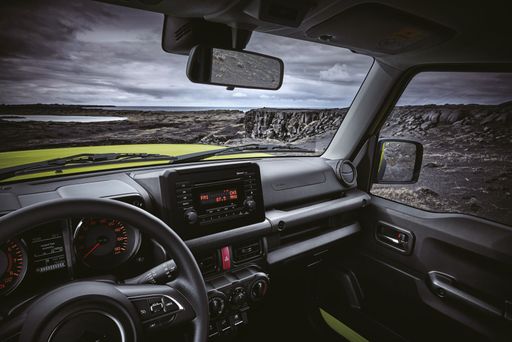Hyundai i20 vs Suzuki Jimny - Differences and prices compared
Costs and Efficiency:
Price and efficiency are often the first things buyers look at. Here it becomes clear which model has the long-term edge – whether at the pump, the plug, or in purchase price.
Hyundai i20 has a clearly advantage in terms of price – it starts at 17400 £, while the Suzuki Jimny costs 25300 £. That’s a price difference of around 7877 £.
Fuel consumption also shows a difference: Hyundai i20 manages with 5.20 L and is therefore clearly more efficient than the Suzuki Jimny with 7.70 L. The difference is about 2.50 L per 100 km.
Engine and Performance:
Power, torque and acceleration say a lot about how a car feels on the road. This is where you see which model delivers more driving dynamics.
When it comes to engine power, the Suzuki Jimny has a minimal edge – offering 102 HP compared to 100 HP. That’s roughly 2 HP more horsepower.
In acceleration from 0 to 100 km/h, the Hyundai i20 is somewhat quicker – completing the sprint in 11.10 s, while the Suzuki Jimny takes 12.80 s. That’s about 1.70 s faster.
In terms of top speed, the Hyundai i20 performs noticeable better – reaching 183 km/h, while the Suzuki Jimny tops out at 145 km/h. The difference is around 38 km/h.
There’s also a difference in torque: Hyundai i20 pulls evident stronger with 200 Nm compared to 130 Nm. That’s about 70 Nm difference.
Space and Everyday Use:
Beyond pure performance, interior space and usability matter most in daily life. This is where you see which car is more practical and versatile.
Seats: Hyundai i20 offers significantly more seating capacity – 5 vs 2.
In curb weight, Hyundai i20 is hardly perceptible lighter – 1088 kg compared to 1165 kg. The difference is around 77 kg.
In maximum load capacity, the Hyundai i20 performs evident better – up to 1165 L, which is about 302 L more than the Suzuki Jimny.
When it comes to payload, Hyundai i20 convincingly takes the win – 472 kg compared to 270 kg. That’s a difference of about 202 kg.
Who comes out on top?
Overall, the Hyundai i20 shows itself to be outperforms in nearly all aspects and secures the title of DriveDuel Champion.
It convinces with the more balanced overall package and proves to be the more versatile choice for everyday use.
 @ Hyundai Motor Company
@ Hyundai Motor Company
Hyundai i20
Costs and Consumption
View detailed analysis
Engine and Performance
View detailed analysis
Dimensions and Body
View detailed analysis
Hyundai i20
The Hyundai i20 is a cheeky small car that mixes smart styling with sensible practicality, feeling more polished and roomy than you might expect for the money. It’s an easy car to live with, offering engaging handling, a comfy cabin and useful equipment that make daily commutes and weekend errands notably less dull.
details @ Hyundai Motor Company
@ Hyundai Motor Company
 @ Hyundai Motor Company
@ Hyundai Motor Company
 @ Hyundai Motor Company
@ Hyundai Motor Company
 @ Hyundai Motor Company
@ Hyundai Motor Company
 @ Hyundai Motor Company
@ Hyundai Motor Company
Suzuki Jimny
Brimming with raucous charm and unabashed off-road spirit, the Suzuki Jimny makes light work of rough tracks while remaining surprisingly at home in city streets. It's a cheeky, no-nonsense companion for buyers who prefer character over conformity — think go-anywhere attitude in a pocket-sized package.
details @ Suzuki Motor Corporation
@ Suzuki Motor Corporation
 @ Suzuki Motor Corporation
@ Suzuki Motor Corporation
 @ Suzuki Motor Corporation
@ Suzuki Motor Corporation
 @ Suzuki Motor Corporation
@ Suzuki Motor Corporation
 @ Hyundai Motor Company
@ Hyundai Motor Company
|
 @ Suzuki Motor Corporation
@ Suzuki Motor Corporation
|
|
|
|
Costs and Consumption |
|
|---|---|
|
Price
17400 - 24000 £
|
Price
25300 - 27700 £
|
|
Consumption L/100km
5.2 - 5.3 L
|
Consumption L/100km
7.70 L
|
|
Consumption kWh/100km
-
|
Consumption kWh/100km
-
|
|
Electric Range
-
|
Electric Range
-
|
|
Battery Capacity
-
|
Battery Capacity
-
|
|
co2
119 - 121 g/km
|
co2
173 g/km
|
|
Fuel tank capacity
40 L
|
Fuel tank capacity
40 L
|
Dimensions and Body |
|
|---|---|
|
Body Type
Hatchback
|
Body Type
Off-Roader
|
|
Seats
5
|
Seats
2
|
|
Doors
5
|
Doors
3
|
|
Curb weight
1088 - 1190 kg
|
Curb weight
1165 kg
|
|
Trunk capacity
352 L
|
Trunk capacity
-
|
|
Length
4065 - 4075 mm
|
Length
3645 mm
|
|
Width
1775 mm
|
Width
1645 mm
|
|
Height
1450 - 1455 mm
|
Height
1705 mm
|
|
Max trunk capacity
1165 L
|
Max trunk capacity
863 L
|
|
Payload
450 - 472 kg
|
Payload
270 kg
|
Engine and Performance |
|
|---|---|
|
Engine Type
Petrol
|
Engine Type
Petrol
|
|
Transmission
Automatic, Manuel
|
Transmission
Manuel
|
|
Transmission Detail
Dual-Clutch Automatic, Manual Gearbox
|
Transmission Detail
Manual Gearbox
|
|
Drive Type
Front-Wheel Drive
|
Drive Type
All-Wheel Drive
|
|
Power HP
79 - 100 HP
|
Power HP
102 HP
|
|
Acceleration 0-100km/h
11.1 - 13.7 s
|
Acceleration 0-100km/h
12.80 s
|
|
Max Speed
166 - 183 km/h
|
Max Speed
145 km/h
|
|
Torque
113 - 200 Nm
|
Torque
130 Nm
|
|
Number of Cylinders
3 - 4
|
Number of Cylinders
4
|
|
Power kW
58 - 74 kW
|
Power kW
75 kW
|
|
Engine capacity
998 - 1197 cm3
|
Engine capacity
1462 cm3
|
General |
|
|---|---|
|
Model Year
2024
|
Model Year
2021 - 2024
|
|
CO2 Efficiency Class
D
|
CO2 Efficiency Class
F
|
|
Brand
Hyundai
|
Brand
Suzuki
|
What drivetrain options does the Hyundai i20 have?
The Hyundai i20 is offered with Front-Wheel Drive.
The prices and data displayed are estimates based on German list prices and may vary by country. This information is not legally binding.
